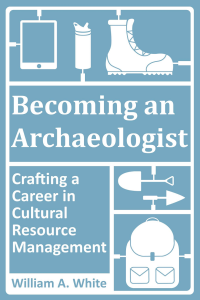 (This is part of a new and ongoing series called Thor’s Day Cultural Resource Management Archaeology Hacks. Quick as lightning, these tips are designed to help you make the impact of Mjölnir on your next project.)
(This is part of a new and ongoing series called Thor’s Day Cultural Resource Management Archaeology Hacks. Quick as lightning, these tips are designed to help you make the impact of Mjölnir on your next project.)
“‘But all I earn is mine to keep, is it not?’ I demanded.
“’Far from it,’ he replied…’ What have you to show for your earnings of the past month? What for the past year? Fool! You pay to everyone but yourself… If you did keep for yourself one-tenth of all you earn, how much would you have in ten years?’” (The Richest Man in Babylon; Clason 1926:25—26).
That passage is from the legendary personal finance book The Richest Man in Babylon, which is a must-read for everyone working in cultural resource management archaeology. It was written by George Samuel Clason and initially composed of a series of pamphlets distributed by banks in the 1920s. It was first published as a book in 1926, just before the Great Depression, and has been republished many times since because the basic information in this book is sound advice for anyone living in a capitalist society. This is not really an archaeology hack as much as a maxim for financial survival that everybody should follow.
The book is a series of parables written in the syntax of the King James Version of the Bible. It is portrayed as the account of a British archaeologist that discovered a series of cuneiform tablets in Mesopotamia that contained the secrets of wealth. Clason’s book is supposed to expand upon the information on the tablets.
In the book, two friends ask the Richest Man in Babylon, named Arkad, how they can also become wealthy. Arkad gives them seven commandments if they are to become wealthy. The first commandment is for them to start saving a portion of their income. Arkad recommends saving 10 percent.
Why save 10 percent of your income?
- You probably will not miss such a small amount.
- It forces you to live within your means because you cannot save what you spend (Which is Arkad’s second commandment).
- If you cannot spare 10%, this goal will force you to cut back your expenses until you can manage it.
- It gives you a baseline goal to work towards.
- You will create a nest egg that can be used for investments and to prevent financial catastrophe.
Of course, you can save more but making a goal of putting aside 10% of your income is an excellent start. They key is to deposit your 10% BEFORE you pay anybody else. You have to pay yourself first otherwise you won’t do it because it is much more fun to spend money than it is to save it.
This simple exercise is the first step toward becoming financially independent. All of us have to work in order to survive in the United States. It is far easier to save a dollar earned rather than earn another dollar. Dutifully saving 10% is not difficult and it will continue growing throughout your adult life. You will be amazed how fast a paltry $100—200 each month can grow into thousands of dollars. I’ve practiced this exercise since I was a teenager and this has allowed me to buy a house, cars, and make investments. As an archaeologist, I could not rely on my employer to pay my expenses so I had to build my own safety net. That 10% has saved me and my family more times than I can count because, whenever I got laid off or had to relocate, I could always draw upon my emergency fund until we got back on our feet.
Clason explains, “The turning point in these men’s lives came upon that day when they realized the truth that had come from…Arkad to them: A part of all you earn is yours to keep.” Saving 10% of your income could be a turning point in your life as well.
You can download a free copy of The Richest Man in Babylon here (www.ccsales.com/the_richest_man_in_babylon.pdf)
Do you regularly put away some of your income? If so, write a comment below or send me an email.
 Having trouble finding work in cultural resource management archaeology? Still blindly mailing out resumes and waiting for a response? Has your archaeology career plateaued and you don’t know what to do about it? Download a copy of the new book “Becoming an Archaeologist: Crafting a Career in Cultural Resource Management” Click here to learn more.
Having trouble finding work in cultural resource management archaeology? Still blindly mailing out resumes and waiting for a response? Has your archaeology career plateaued and you don’t know what to do about it? Download a copy of the new book “Becoming an Archaeologist: Crafting a Career in Cultural Resource Management” Click here to learn more.
Check out Succinct Research’s contribution to Blogging Archaeology. Full of amazing information about how blogging is revolutionizing archaeology publishing. For a limited time you can GRAB A COPY FOR FREE!!!! Click Here
 “Resume-Writing for Archaeologists” is now available on Amazon.com. Click Here and get detailed instructions on how you can land a job in CRM archaeology today!
“Resume-Writing for Archaeologists” is now available on Amazon.com. Click Here and get detailed instructions on how you can land a job in CRM archaeology today!
 Small Archaeology Project Management is now on the Kindle Store. Over 300 copies were sold in the first month! Click Here and see what the buzz is all about.
Small Archaeology Project Management is now on the Kindle Store. Over 300 copies were sold in the first month! Click Here and see what the buzz is all about.
Join the Succinct Research email list and receive additional information on the CRM and heritage conservation field.
Get killer information about the CRM archaeology industry and historic preservation.




Nice post, Bill. I feel this is an important topic for everybody but especially archaeologists. In my experience, there has been peer pressure to spend and (kind of save) my income while working in & out of the field. I think many of us can be quite the consumer- books, beer, antiques, tech toys, etc.
Right now, while I’m not saving 10% of my income I am setting aside money for a new used car and doing the 52 week challenge to go on a special trip next year. But I wholly agree with you, that you’ve got to pay yourself first or you’ll always wonder where your money has gone. I’m most focused on getting out of debt (I.e. student loans; I recently just got out of consumer debt-yay!) as my first line of building wealth. I’m working Dave Ramsey’s baby steps and baby step 2 is getting 100% debt free ( except the house- if you have a mortgage). There I’ve learned just how invaluable getting on a written budget is and telling my money where to go. Since starting the baby steps 14 months ago I’ve saved more money & cash flowed more than I ever thought possible!
It really is amazing how fast just 10% of your income can build up. I will have to look into that Dave Ramsay plan. Do you have a link?
Bill
I like the post but I would take it one step farther. Put 10% of your income away in a Roth IRA. Most employers these days have agreements with financial services companies so you do not even have to think about depositing that money into an account once you set it up. Roth IRAs allow you to choose where you invest your money but the government incentives investors to save for retirement by having the earnings of Roth IRAs tax-free! With one catch, that you keep the money you have invested in the account until you are of a retirement age. It is not sexy investing but I know far too many people, and archaeologists especially, who are not saving adequately for retirement.
I think saving 10% of your income for the next purchase is indeed a positive thing, it gets one in the habit of saving and thinking of the future. But, often times in my experience that money ends up getting used in a tight squeeze and the long term investment benefits i.e. interest are not earned. It is hard as a CRM archaeologist to delay the satisfaction of your earnings, especially when you aren’t sure when the work is going to run out. However, I think the bottom line is we as a society and a profession need to emphasize to people coming into the workforce that retirement savings should be a big concern and goal for you not once you turn 40 or 60, but when you start your first job. The benefits are astronomical.
Thanks for the great response and thank you for reading this post.
10% is an excellent start and should be the foundation of your safety net. But, if you’re lucky enough to have work, once you have a 3 month nest egg its time to start looking for investments. That’s the general rule, but I like how you suggested that you just start a Roth IRA anyway, regardless of nest egg, because as you pointed out, we are frequently living from paycheck to paycheck. That nest egg never gets a chance to hatch because we have to spend it so frequently. If you just start the IRA, you will be able to keep contributing to it whenever you can. It would be great if all CRM company retirement programs flowed into the same 401K and traditional IRA. In order to keep the ball rolling, you will be forced to roll all those random retirement accounts into one that (most of the time) you started on your own. Mike, your suggestion makes sure you are saving for retirement even if you do not qualify for your company’s program. I like it. It needs to be featured on an upcoming Archaeology Hack. Thanks again